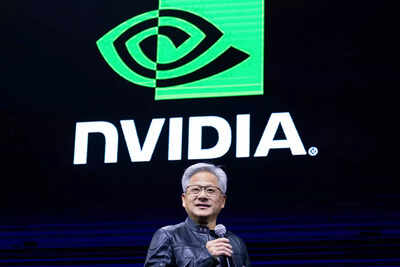Nvidia CEO 'trashes' MIT study claiming AI makes people dumber, says: My advice to MIT test participants is, "Apply…" - The Times of India

Nvidia CEO Jensen Huang disputes MIT research suggesting AI diminishes cognitive abilities, asserting his daily AI use enhances his thinking. He argues that formulating quality questions for AI requires analytical and reasoning skills. Huang uses multiple AI systems to cross-reference and critique responses, strengthening his analytical abilities.
Nvidia CEO
Jensen
Huang
dismissed recent MIT research suggesting
artificial intelligence
diminishes cognitive abilities, arguing instead that his daily AI use has actually enhanced his thinking skills. Speaking on CNN's "Fareed Zakaria GPS" that aired Sunday, Huang said he uses AI "literally every single day" and believes his "
cognitive skills
are actually advancing.""I haven't looked at their research yet, but I have to admit, I'm using AI literally every single day," Huang stated during the interview. "I think my cognitive skills are actually advancing, and the reason for that is because I am not asking it to do the thinking for me."The MIT Media Lab study, which analyzed 54 subjects writing SAT essays using ChatGPT, Google Search, or no tools, found that
ChatGPT
users showed the lowest brain engagement and "consistently underperformed at neural, linguistic, and behavioral levels." Researchers used EEG technology to monitor brain activity across 32 regions during the writing process.
Huang challenged the study's methodology, questioning how participants were using
AI tools
. "I'm not exactly sure what people are using it for that would cause you to now not have to think," he said on the CNN program. "But if you have the thing in order, for example, the idea of prompting an AI, the idea of asking questions... you're spending most of your time today asking me questions in order to ask good questions. It's a highly cognitive skill."Nvidia
CEO emphasized that AI should be used as a learning tool rather than a replacement for thinking. "I'm asking it to teach me many things that I don't know or help me solve problems otherwise I wouldn't be able to solve reasonably or research," Huang explained during the Sunday interview.Huang further that effective AI interaction requires sophisticated cognitive skills, particularly in formulating quality questions. "As a CEO, I spend most of my time asking questions, and 90% of my instructions are actually, you know, conflated with questions," Huang explained. "When I'm interacting with AI, it's a questioning system. You're asking a question, so I think that in order to formulate good questions, you have to be thinking, have to be analytical, reasoning yourself."
Huang described his approach of using multiple AI systems to cross-reference and critique responses. "I wouldn't just receive it. Usually, what I do is say, 'Are you sure this is the best answer you can provide?' Take the answer from one AI, give it to another AI, ask them to critique itself," he said during the CNN interview. "There's no different than getting three doctors' opinions."This methodology, according to Huang, actually strengthens analytical abilities rather than weakening them. "So I think that process of critiquing and critiquing the answers of your critical thinking enhances cognitive skills," he concluded on "Fareed Zakaria GPS," offering direct advice to the
MIT study
participants: "Apply critical thinking."
You may also like...
Diddy's Legal Troubles & Racketeering Trial

Music mogul Sean 'Diddy' Combs was acquitted of sex trafficking and racketeering charges but convicted on transportation...
Thomas Partey Faces Rape & Sexual Assault Charges

Former Arsenal midfielder Thomas Partey has been formally charged with multiple counts of rape and sexual assault by UK ...
Nigeria Universities Changes Admission Policies

JAMB has clarified its admission policies, rectifying a student's status, reiterating the necessity of its Central Admis...
Ghana's Economic Reforms & Gold Sector Initiatives

Ghana is undertaking a comprehensive economic overhaul with President John Dramani Mahama's 24-Hour Economy and Accelera...
WAFCON 2024 African Women's Football Tournament

The 2024 Women's Africa Cup of Nations opened with thrilling matches, seeing Nigeria's Super Falcons secure a dominant 3...
Emergence & Dynamics of Nigeria's ADC Coalition

A new opposition coalition, led by the African Democratic Congress (ADC), is emerging to challenge President Bola Ahmed ...
Demise of Olubadan of Ibadanland
Oba Owolabi Olakulehin, the 43rd Olubadan of Ibadanland, has died at 90, concluding a life of distinguished service in t...
Death of Nigerian Goalkeeping Legend Peter Rufai

Nigerian football mourns the death of legendary Super Eagles goalkeeper Peter Rufai, who passed away at 61. Known as 'Do...


